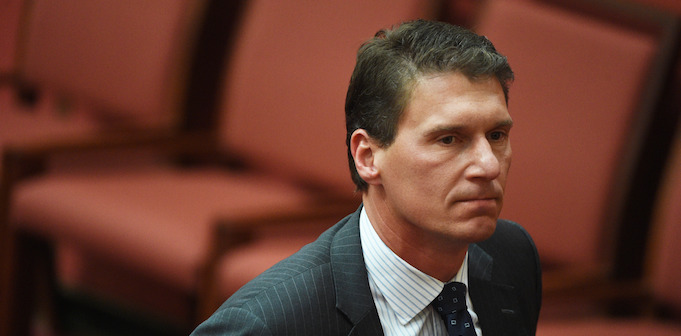
Senator Cory Bernardi’s decision to quit the Liberal Party and start his own political party could add another level of complexity to the government’s suite of business and startup policies that have not yet made their way through the Senate.
The ABC reports this morning that Bernardi has contacted Prime Minister Malcolm Turnbull to inform him he will be leaving the Liberals to form his own party, The Australian Conservatives.
Bernardi was first elected as a senator of South Australia in 2006, and was re-elected at the 2016 federal election. A former business operator himself, the Senator has previously spoken about what governments should do to help SMEs.
“More can be done, particularly for the many thousands of men and women who operate in small business,” he said in his maiden speech in 2006, reflecting on his time working as a hotelier and in the financial services industry before entering politics.
“We also need to make dealing with government easier by making the small business environment as streamlined and effective as possible. By making available a simple business structure that provided flow-through taxation benefits and limited liability, we could encourage investment in small business.
“Australian business needs to invest even more in people, in training and in research and development.”
Bernardi is no stranger to making news headlines due to his conservative politics and recently, his thoughts on what the election of US President Donald Trump could mean for “change” in Australia. His views on Australian businesses securing halal certification have also garnered plenty of attention.
In 2015, he led a push to establish a Senate investigation on food certificate schemes, including Australian products that receive halal certification, which was supported in the Senate by the Coalition and six Senate crossbenchers.
Read more: 14 must-watch policy areas for SMEs in 2017
A new layer of complication in the Senate
The final sitting weeks of parliament in 2016 saw the Coalition face significant challenges in negotiating legislation through the Senate, including a chaotic resolution of the backpacker tax.
The formation of a new party in the Senate adds another element to the negotiating landscape at a time when the federal government still has a number of business and innovation policies from the 2016 budget yet to pass through parliament.
While it’s unclear how Bernardi’s party will approach tax reform, the Coalition is still working on securing its ’10 Year Enterprise Tax Plan’, which includes a reduction in the company tax rate down to 25% by 2026-2027 for businesses of all sizes, and tax cuts for more small businesses thanks to a proposed increase in the annual turnover threshold from $2 million to $10 million.
The legislation for the proposed tax cuts has implications for the government’s proposal to extend the $20,000 instant asset write-off scheme to more small businesses, as that extension also relies on the small business turnover threshold increasing from $2 million to $10 million.
The Coalition now holds 29 seats in the Senate and in order to pass legislation, it would need 39 votes. The Labor Party and the Greens oppose the government’s plan to cut the corporate tax rate for businesses of all sizes and so the Coalition would need to secure support among the crossbenchers in order to get the full package across the line.
However, Bernardi has previously indicated his support for lower rates of taxation across the board.
In 2015 when Prime Minister Tony Abbott backed away from a promised across-the-board company tax cut and instead shifted focus to tax cuts for small businesses, Senator Bernardi told the ABC’s The World Today program that he supported taxes being lowered across the board as much as possible, even if it started with small and medium enterprises only.
“I welcome any decision to lower taxes by the government, but you know quite frankly, I’d like to see them lowered as much as possible and right across the spectrum for all marginal taxpayers as well,” he said.
The passage of company tax cuts remains a key point of conflict between the government and opposition as parliamentarians return to Canberra this week, with Labor maintaining its opposition to tax cuts for big businesses and Prime Minister Malcolm Turnbull claiming the proposed plan will leave all workers better of to the tune of hundreds of dollars each year.
Another key piece of the Coalition’s business policy still be determined is the second stage of the innovation agenda, which Prime Minister Malcolm Turnbull has been enthusiastically championing over the past 12 months.
Arthur Sinodinis has only just been appointed as new Minister of Industry, Innovation and Science after Greg Hunt’s move to the health portfolio, and while the former Innovation Minister had said the second wave of the agenda would be revealed in 2017, the timeline on those announcements is unclear.
Never miss a story: sign up to SmartCompany’s free daily newsletter and find our best stories on Twitter, Facebook, LinkedIn and Instagram.


COMMENTS
SmartCompany is committed to hosting lively discussions. Help us keep the conversation useful, interesting and welcoming. We aim to publish comments quickly in the interest of promoting robust conversation, but we’re a small team and we deploy filters to protect against legal risk. Occasionally your comment may be held up while it is being reviewed, but we’re working as fast as we can to keep the conversation rolling.
The SmartCompany comment section is members-only content. Please subscribe to leave a comment.
The SmartCompany comment section is members-only content. Please login to leave a comment.